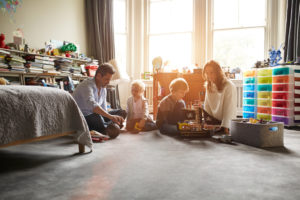 A divorce or separation can be emotionally taxing at best. However, when children are involved, parents must find a way to co-parent to minimize the negative impact. I often say to couples, “Your relationship is not ending. It is changing.”
A divorce or separation can be emotionally taxing at best. However, when children are involved, parents must find a way to co-parent to minimize the negative impact. I often say to couples, “Your relationship is not ending. It is changing.”
You will always be parents to your children. Someday you may be grandparents to their children. It is imperative that you learn to co-parent collaboratively in spite of any differences.
I have often said that having children is like watching part of your soul walk around outside of you. The vulnerability that comes with parenting cannot be overstated. When one parent makes it difficult to co-parent and to do what is in the best interest of the kids, it can be difficult to not become reactive and allow emotions to become charged.
I urge you to try to sustain a positive outlook about co-parenting, even if it is difficult to work with the other parent. The goal is to provide children with quality parenting and ultimately, a happy childhood in spite of divorce or separation. Here are some strategies for creating a positive co-parenting relationship:
- Always put the health and happiness of your children first, despite any differences with the other parent. It can be helpful to enlist the aid of a family therapist while creating a positive co-parenting relationship.
- Communicate about your children in the most effective way possible. You and the other parent may not be able to communicate face-to-face at first without getting upset. For a short-term solution, it may be best to communicate and share information about your children online. Digital communication may not be a long-term solution, however. If you and your partner can’t talk or be around each other without getting upset, you may send a negative message to your children. Children tend to feel more positive about their parents if they can observe the adults collaborating.
- Be on the same page as much as possible regarding rules, value systems, discipline, homework, hygiene, screen time, and chores. Children benefit from the security of predictability. You and the other parent can do a better job of providing structure when you are working as a team toward the same goals.
- Children deserve to know what they can count on. You and your co-parent should adhere to the parenting schedule as much as possible. Children need to know they can rely on having quality time with each parent. When the parenting schedule isn’t consistent, children can experience anxiety because they perceive things aren’t predictable. When change is unavoidable, communicate with the other parent and with the children as much as possible about expectations.
- Be respectful and avoid talking in a negative way about the other parent. Children will eventually see who each parent truly is as they get older. If a parent doesn’t have strong character, children will learn that for themselves. If you need to vent about the other parent, be sure the children cannot hear what you are venting about. You can get support for yourself by seeing a therapist.
- Reinforce the other parent’s strengths. Children do not need to hear it verbalized to perceive their loyalty needs to be divided. Children can develop the idea that they need to choose sides by experiencing the dynamic between co-parents. By talking about the other parent’s positive qualities, you can remove the pressure your children may feel about the need to be loyal to the other parent.
- Try to empathize with what it must be like for a child to witness or listen to conflict between parents. Ask yourself if your actions will encourage a positive or negative perception in your children.
- Take care of yourself! There is no way you can provide the care your children need if you aren’t healthy. Participate in activities that re-energize you. Practice self-compassion and nurture yourself. You may be a better parent if you make self-care a priority.
- Co-parents need to agree on the roles new significant others will have. As time passes and relationships mature, remember to keep what is in your children’s best interest at the top of your priority list.
- Modeling forgiveness can be powerful for children to see. This includes both self-forgiveness and forgiveness of the other parent. When children observe parents forgiving themselves and each other, children learn it is possible to recover from traumatic events.
If you and the other parent can separate or divorce with a spirit of collaboration, it may increase the odds that the divorce will be amicable, which may increase the odds that your children will experience less trauma. After a divorce or separation, a solid and collaborative co-parenting relationship can serve as a support system and a source of strength for children.
© Copyright 2018 GoodTherapy.org. All rights reserved.
The preceding article was solely written by the author named above. Any views and opinions expressed are not necessarily shared by GoodTherapy.org. Questions or concerns about the preceding article can be directed to the author or posted as a comment below.

 Stay Together for the Kids? When Divorce Might Benefit Everyone
Stay Together for the Kids? When Divorce Might Benefit Everyone How to Tell the Kids You Are Getting Divorced
How to Tell the Kids You Are Getting Divorced The Insidious Impact of Parental Conflict on Child Behavior
The Insidious Impact of Parental Conflict on Child Behavior